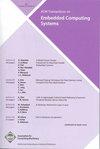A Comprehensive Model for Efficient Design Space Exploration of Imprecise Computational Blocks
IF 2.8
3区 计算机科学
Q2 COMPUTER SCIENCE, HARDWARE & ARCHITECTURE
引用次数: 0
Abstract
After almost a decade of research, development of more efficient imprecise computational blocks is still a major concern in imprecise computing domain. There are many instances of the introduced imprecise components of different types, while their main difference is that they propose different precision-cost-performance trade-offs. In this paper, a novel comprehensive model for the imprecise components is introduced, which can be exploited to cover a wide range of precision-cost-performance trade-offs, for different types of imprecise components. The model helps to find the suitable imprecise component based on any desired error criterion. Therefore, the most significant advantage of the proposed model is that it can be simply exploited for design space exploration of different imprecise components to extract the suitable components, with the desired precision-cost-performance trade-off for any specific application. To demonstrate the efficiency of the proposed model, two novel families of Lowest-cost Imprecise Adders (LIAs) and Lowest-cost Imprecise Multipliers (LIMs) are introduced in the paper, which are systematically extracted based on exploration of the design space provided by the proposed model. A wide range of simulation and synthesis results are also presented in the paper to prove the comparable efficiency of the systematically extracted LIA/LIM structures with respect to the most efficient existing human-made imprecise components both individually and in a Multiply-Accumulate application.非精确计算块高效设计空间探索的综合模型
经过近十年的研究,开发更高效的非精确计算块仍然是非精确计算领域的一个主要问题。引入的不同类型的不精确组件有许多实例,而它们的主要区别在于它们提出了不同的精度-成本-性能权衡。本文介绍了一种新的不精确部件综合模型,该模型可用于涵盖不同类型的不精确部件的广泛精度-成本-性能权衡。该模型可以根据任何期望的误差准则找到合适的不精确分量。因此,所提出的模型最显著的优点是,它可以简单地用于不同不精确组件的设计空间探索,以提取合适的组件,并为任何特定应用提供所需的精度-成本-性能权衡。为了证明所提模型的有效性,本文引入了两个新的最低成本不精确加法器(LIAs)和最低成本不精确乘法器(LIMs)族,并在探索所提模型提供的设计空间的基础上系统地提取了它们。本文还提供了广泛的仿真和综合结果,以证明系统提取的LIA/LIM结构相对于最有效的现有人造不精确部件的效率相当,无论是单独的还是在乘法累积应用中。
本文章由计算机程序翻译,如有差异,请以英文原文为准。
求助全文
约1分钟内获得全文
求助全文
来源期刊

ACM Transactions on Embedded Computing Systems
工程技术-计算机:软件工程
CiteScore
3.70
自引率
0.00%
发文量
138
审稿时长
6 months
期刊介绍:
The design of embedded computing systems, both the software and hardware, increasingly relies on sophisticated algorithms, analytical models, and methodologies. ACM Transactions on Embedded Computing Systems (TECS) aims to present the leading work relating to the analysis, design, behavior, and experience with embedded computing systems.
 求助内容:
求助内容: 应助结果提醒方式:
应助结果提醒方式:


